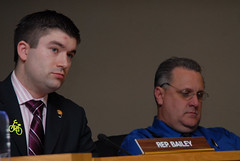State Representative Jules Bailey (D-Portland) will support a bill in the 2011 legislative session that would amend the Oregon Constitution to make it easier to spend state revenue on transportation projects outside of the highway right-of-way. If the bill is passed by the legislature, it would be sent out to voters for final passage (or not) in the November 2011 general election.
Rep. Bailey’s intention is to give more flexibility to city, county, and state officials on how they can spend state transportation funds. Currently, Oregon law mandates that gas tax and motor vehicle operation and license fee revenues can only be spent within the highway right-of-way. This means about $1.39 billion in biennial revenue generated by the state of Oregon must be spent on highway projects.
(Luckily, we’ve got the Bicycle Bill that mandates a minimum of 1% of highway money must be spent on bicycling and walking projects. At its worst, that money is spent on four-five foot bike lanes on high-speed, state highways; at its best, we have the multi-use path adjacent to I-205.)
Rep. Bailey’s office confirmed for me yesterday that the House Revenue Committee, of which Bailey is Vice-Chair, has introduced the measure at Bailey’s request. Here’s the draft summary:
“Proposing amendment to Oregon Constitution to allow revenue from taxes on motor vehicle fuel and ownership, operation or use of motor vehicles to be used for transportation projects that will prevent or reduce pollution and congestion created by use of motor vehicles.”
Bailey’s key proposed addition to the existing language of the constitution seeks to expand the definition of “transportation projects”:
“As used in this section, “transportation project” means any project or undertaking that facilitates any mode of transportation within this state. “Transportation project” includes, but is not limited to, a project for highway, transit, rail and aviation capital infrastructure, bicycle and pedestrian paths, bridges and ways, and other projects that facilitate the transportation of materials, animals or people.”
This effort by Rep. Bailey shows his creativity in using existing transportation dollars in new ways to fund a more multi-modal system, instead of looking for new revenue (which no sane person will do this session). This also jibes with ODOT’s stated vision to try and ween itself off highways and begin to give more people around the state other options to get around.
Keep in mind, even if this effort can make it through the legislature, since it’s a change to the Oregon Constitution, it must be approved by voters. Whether or not a majority of Oregonians share the vision of multi-modal future remains to be seen.
The 2011 legislative session is just now heating up. Stay tuned for more on this and other bike and transportation-related action in the months to come.


